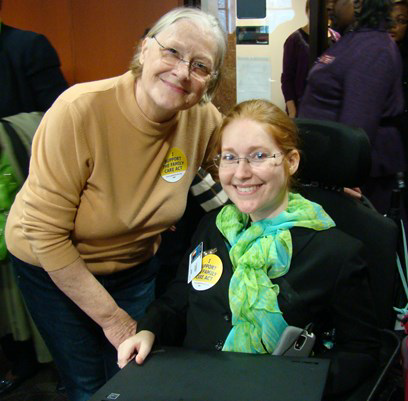This blog is part of our Medicaid Awareness Month series, in which we highlight the ways that Medicaid supports the health of vulnerable populations. Guest bloggers for the series are state advocates who work on behalf of Medicaid from different vantage points.
While most people are aware that Medicaid provides access to health care services (e.g., doctors’ visits, medications or diagnostic tests) to those who receive it, many people are not aware that for people with disabilities, Medicaid is truly a lifeline to the community. Here at the Georgia Council on Developmental Disabilities (GCDD), we love Medicaid so much that we launched an “I love Medicaid” campaign! The GCDD’s mission is to promote public policy that creates an integrated community life for people with developmental disabilities and their families by sharing information, coordinating public outreach, and implementing strategic legislative advocacy.
As the Public Policy Director for the GCDD, I educate legislators and other members of the public on the importance of Medicaid and other policy issues that are important to people with disabilities.
Medicaid is the Primary Funding Source for Essential Long-Term Services and Supports
Medicaid is the primary funding source for long-term services and supports for people with disabilities, including home and community-based services (HCBS). HCBS waivers enable individuals with disabilities who require an institutional level of care to receive the supports they need that will allow them to stay in their own home and community rather than being forced to go to a facility. For the majority of people with disabilities who need such support, paying for the long-term care they need to live in the community would be impossible without Medicaid. Most insurance does not cover services such as caregivers to assist with daily living needs like bathing, dressing or toileting, as well as transportation and employment services. Not only do people with disabilities prefer to live in their own home surrounded by their loved ones, but also it is well documented that on average institutional settings are more expensive to states than providing care in the community through HCBS waivers.
Within the Medicaid program, there has been a historical structural bias toward institutional care. States are required to cover nursing facility benefits, while coverage of most HCBS is optional. Depending on the state in which you live, the HCBS options that exist vary considerably with respect to which services are offered and the populations covered. Additionally, Medicaid HCBS spending patterns vary among states, and waiting lists often exist for people with disabilities waiting for community-based services. For example, in Georgia, as of December 2017, there was a waiting list of over 8,000 people waiting for the NOW and COMP waivers, the waivers for individuals with intellectual/developmental disabilities.
Medicaid also helps people with disabilities find and hold jobs.
Some states provide supportive employment programs that offer services such as a job coach to help people with disabilities join the workforce and remain employed.
Medicaid provides services for children with disabilities in schools.
People often don’t realize that some Medicaid funding goes into local public school systems to enable those schools to provide certain therapies that some children with disabilities who have an individualized education plan (IEP) may need, such as physical and speech therapy.
GCDD Launches “I Love Medicaid Campaign”
Because of the importance of Medicaid to Georgians with disabilities, GCDD launched an “I love Medicaid Campaign” earlier this year to collect stories from Georgians with disabilities on why Medicaid is important to them. Furthermore, during Georgia’s state legislative session, GCDD held multiple Medicaid advocacy days at Georgia’s State Capitol to educate  legislators on the importance of preserving Medicaid for people with disabilities. Legislators heard from constituents about how devastating cuts to Medicaid could be to people with disabilities, causing vital services to be reduced or eliminated and waiting lists for services that are already large to grow even bigger.
legislators on the importance of preserving Medicaid for people with disabilities. Legislators heard from constituents about how devastating cuts to Medicaid could be to people with disabilities, causing vital services to be reduced or eliminated and waiting lists for services that are already large to grow even bigger.
On a personal level, I love Medicaid as I also happen to be a person with a significant disability who relies on Medicaid. It gives me the ability to live in my own home within my community rather than be forced to live in an institutional setting such as a nursing facility. Medicaid also allows me to have access to my very expensive medical equipment, such as my motorized wheelchair and ventilator, and to work at a job I dearly love. Simply put, Medicaid allows me to have life, liberty and the pursuit of happiness surrounded by the people I love and who love me.
Dawn Alford, Public Policy Director, Georgia Council on Developmental Disabilities
www.gcdd.org, @GeorgiaCouncil @advocateDawn.
